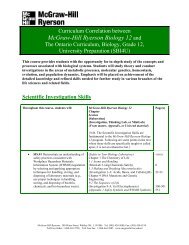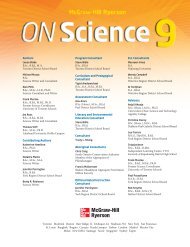Ultranationalism and Crimes against Humanity - McGraw-Hill Ryerson
Ultranationalism and Crimes against Humanity - McGraw-Hill Ryerson
Ultranationalism and Crimes against Humanity - McGraw-Hill Ryerson
You also want an ePaper? Increase the reach of your titles
YUMPU automatically turns print PDFs into web optimized ePapers that Google loves.
Vo i c e s<br />
When my vision cleared, I could not<br />
believe the sights before my eyes.<br />
People . . . so disfigured that it was<br />
impossible to distinguish one person<br />
from another. I began to cry hysterically<br />
<strong>and</strong> to scream out for my mother . . .<br />
— Sakue Shimohira, Nagasaki<br />
survivor, who was 10 years old when<br />
the bomb was dropped in 1945<br />
Figure 7-13 This cemetery in Hiroshima holds<br />
the remains of people who died as a result of the<br />
bombing on August 6, 1945. About 70 000 people<br />
died instantly. Others died later of their injuries or<br />
radiation sickness. By the end of 1945, the death toll<br />
stood at 140 000. Were the bombings of Hiroshima<br />
<strong>and</strong> Nagasaki justified by war — or were they<br />
criminal acts? Explain your response.<br />
162<br />
Recall . . . Reflect . . . Respond<br />
Related Issue 2 • Should nations pursue national interest? • m h R<br />
The Bombing of Hiroshima <strong>and</strong> Nagasaki — 1945<br />
Governments pursue national interest to protect the physical<br />
security of a country <strong>and</strong> its people, to ensure people’s economic<br />
stability <strong>and</strong> prosperity, <strong>and</strong> to protect <strong>and</strong> promote people’s<br />
values, beliefs, <strong>and</strong> culture.<br />
Many people argued that dropping the atom bombs on<br />
Hiroshima <strong>and</strong> Nagasaki in 1945 was in the national interest of<br />
the United States. Some U.S. military experts had warned that<br />
ultranationalist warrior values would prevent Japanese soldiers<br />
<strong>and</strong> civilians from giving up. Japanese prime minister Kantaro<br />
Suzuki, for example, had said that Japan’s only option was to<br />
“fight to the very end.” As a result, the experts warned that up<br />
to 250 000 Americans might die in an invasion of Japan. They<br />
believed that dropping the bombs would save American lives.<br />
U.S. president Harry S. Truman made the final decision to<br />
drop the bombs. Truman believed that it was important to save as<br />
many lives as possible. In a speech made right after the bomb fell<br />
on Hiroshima, he said that Americans would completely destroy<br />
Japan’s power to wage war only by destroying “every productive<br />
enterprise the Japanese have above ground in any city.” These<br />
enterprises included docks, factories, <strong>and</strong> communication systems.<br />
Some of the scientists who had helped build the atomic bomb<br />
asked Truman to warn Japan. They suggested that the United<br />
States set off the bomb in an uninhabited place, perhaps Tokyo<br />
Bay. They believed that this would show the Japanese leaders <strong>and</strong><br />
people how much damage the bomb would cause. Seeing this<br />
would persuade Japan to give up — <strong>and</strong> no civilians would be<br />
harmed.<br />
General Dwight D. Eisenhower, who had comm<strong>and</strong>ed the<br />
victorious Allied forces in Europe <strong>and</strong> who would later become<br />
U.S. president, also disagreed with Truman’s decision. Eisenhower<br />
believed that Japan was already defeated. He said, “Our country<br />
should avoid shocking world opinion by the use of a weapon<br />
whose employment was . . . no longer m<strong>and</strong>atory as a measure to<br />
save American lives.”<br />
1. List three crimes <strong>against</strong> humanity you<br />
have read about. For each, jot down two or<br />
three factors that made the crime possible.<br />
2. Decide whether ultranationalism played a<br />
role in each crime <strong>against</strong> humanity you<br />
listed in response to Question 1. If so,<br />
explain how. If not, explain why not.<br />
3. Nationalism <strong>and</strong> the pursuit of national<br />
interest can lead to ultranationalism, <strong>and</strong><br />
ultranationalism can lead to crimes <strong>against</strong><br />
humanity. Does this make nationalism<br />
dangerous? Explain your response to a<br />
partner.

















